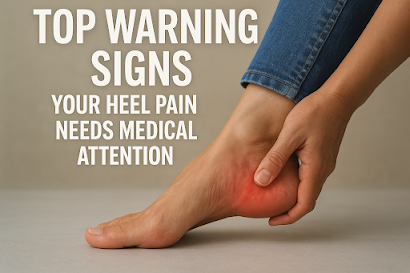Heel pain is one of the most common foot problems affecting people of all ages. While it may seem like a minor issue caused by standing for long hours or wearing the wrong shoes, sometimes it can indicate a serious underlying condition. Ignoring persistent heel pain can worsen the problem and even affect your ability to walk properly. Here are some of the top warning signs that your heel pain needs professional medical attention.
1. Persistent Pain Lasting More Than a Few Days
If your heel pain continues for more than a few days despite rest, ice, and over-the-counter pain relief, it’s time to consult a specialist. Continuous pain could be a sign of chronic inflammation, stress fracture, or plantar fasciitis. Early diagnosis can prevent further damage and ensure faster recovery.
2. Swelling or Redness Around the Heel
Visible swelling, redness, or warmth around the heel area is a major indicator of inflammation or infection. These symptoms could mean bursitis, tendonitis, or even a heel spur. Medical evaluation is crucial to determine the exact cause and provide appropriate treatment.
3. Sharp or Stabbing Pain in the Morning
If you feel a sharp stabbing pain in your heel with your first few steps after waking up, you may be experiencing plantar fasciitis. This condition results from inflammation of the tissue connecting your heel to your toes. Ignoring early symptoms can lead to chronic pain and mobility issues.
4. Heel Pain After an Injury
Any heel pain that starts immediately after an accident, sports injury, or fall should not be ignored. Such pain could indicate a fracture, ligament tear, or severe bruising. Getting an X-ray or MRI from an orthopedic specialist can help rule out serious injuries.
5. Difficulty in Walking or Standing
If your heel pain makes it hard to walk, stand, or bear weight, it’s a strong warning sign that you need medical help. This could be due to bone spurs, nerve compression, or Achilles tendon disorders. Delaying diagnosis can worsen your condition and increase recovery time.
6. Numbness or Tingling in the Heel
Experiencing numbness, tingling, or a burning sensation in your heel may indicate nerve compression or tarsal tunnel syndrome. These symptoms require a thorough neurological and orthopedic evaluation to prevent permanent nerve damage.
7. Pain That Spreads Beyond the Heel
If your heel pain radiates to your arch, ankle, or calf, it might suggest tendon or nerve involvement. Conditions such as Achilles tendinitis or stress fractures can cause referred pain. Only a medical expert can determine the root cause through imaging and clinical evaluation.
8. Heel Pain That Worsens With Rest
Unlike typical soreness that improves with rest, some conditions like nerve entrapment or chronic inflammation can cause pain that persists or worsens even when you’re resting. If this happens, you should seek immediate medical guidance.
9. Changes in Heel Shape or Skin
Noticeable deformities, lumps, or changes in heel shape can indicate bone growths, cysts, or spurs. Similarly, cracks or sores on the heel may signal infections or diabetic complications. A podiatrist can assess and recommend proper treatment to avoid complications.
How Doctors Diagnose Heel Pain
To identify the cause, doctors perform a physical exam and may suggest imaging tests such as X-rays, ultrasounds, or MRIs. Based on the findings, treatment options may include physical therapy, orthotic support, anti-inflammatory medications, or in severe cases, surgical intervention.
Preventing Heel Pain
• Choose supportive footwear with cushioning.
• Maintain a healthy weight to reduce foot pressure.
• Stretch your calf muscles and Achilles tendon regularly.
• Avoid walking barefoot on hard surfaces.
• Rest your feet after prolonged standing or activity.
Conclusion
Heel pain may seem minor initially, but persistent discomfort or any unusual symptoms should never be ignored. Seeking timely medical attention ensures quick recovery and prevents chronic conditions from developing.
If you notice any of these warning signs, consult a foot and ankle specialist immediately for an accurate diagnosis and personalized treatment plan.

